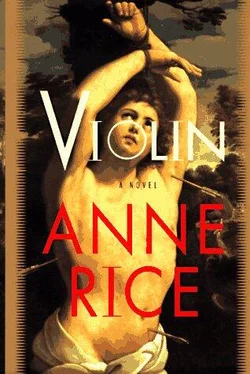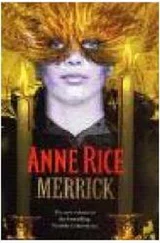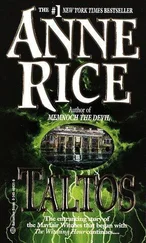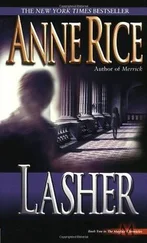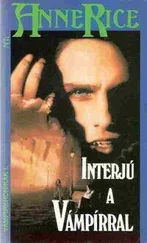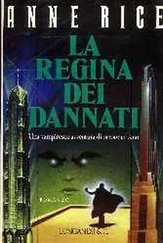I heard it now, my own song. I heard it, and it seemed the light around me had swelled impossibly. I didn't want such bright light and yet it was so lovely, this light that rose up to the beams I knew to be above.
And, opening my eyes, I saw not only the great hall filled with rows and rows of faces, but I saw Stefan, and the light was directly behind him, and yet he reached out at me.
"Stefan, turn!" I said. "Stefan, look! Stefan!"
He did turn. There was a figure in the light, a short stubby figure, beckoning to Stefan in great impatience, Come. I gave the music one last thrust.
Stefan, go! You are the lost child! Stefan!
I could play no more.
Stefan glared at me. He cursed at me. He made his hands into fists. Yet his face changed. It underwent some complete and seemingly unconscious transformation. He gazed at me with wide and frightened eyes.
The light behind him faded as he drew close, a dark shadow, fading even as he hovered over me, a gloom no more substantial than the shadows in the wings.
The music was ended.
I saw the audience rise en masse. Another victory. How so, God? How so?
Three tiers and they reward this din that is my only tongue.
The hall roared with applause.
Another victory.
There was no sight or sound of those contrived ghosts.
Someone had come to take me from the stage. I stared out into the faces, nodding; do not disappoint, sweep the hall with your eyes, all the way to the right and to the left, look up at the topmost balconies and then at the boxes, don't raise your arms in vanity, merely bow, and bow, and murmur thanks and they will know, thanks from my bloody soul.
In one last dim flash I saw him, close to me, confused, bent, near invisible, fading.
A wretched miserable thing. But what was this bewilderment? This strange wonder in his eyes. He was gone.
I was held by others once again, oh, lucky, lucky girl, to have such kind and helping hands. 0 Fate, fortune, fame, and destiny.
Stefan, you coull have gone into the light. Stefan, you should have gone!
Backstage, I cried and cried.
No one thought it the slightest bit unusual. The cameras flashed, the reporters wrote. I knew no doubt within my heart of peace for those I'd lost-except for Faye . . .
and Stefan.
Chapter 20
I WENT to the Teatro Amazones in Manaus because it was a singular place and I had seen it once in a movie. Fitzcarrallo had been the name of the film, made by a German director, Werner Herzog, now dead, and Lev and I in the hellish time after Lily's death had spent a calm night with each other at the show, actually together.
I didn't remember the plot, only the opera house, and the stories I had heard of the rubber boom and the luxury of the theater, and how splendid it was, though nothing on earth would ever compare with this palace in Rio de Janeiro.
Also I had to play another concert immediately. I had to. I had to see if the ghosts would come back. I had to see if it was over.
There was a little controversy before we left for the state of Amazonas.
Grady called and insisted that we go back to New Orleans.
He would not tell us why, but went on and on that we must come home, until finally Martin took the phone and, in his subdued abusive way, demanded to know what was Grady's meaning.
"Look, if Faye is dead, tell us. Just say so. We don't have to fly home to New Orleans to hear the news. Tell us now."
Katrinka shivered.
After a long moment, Martin covered the phone. "It's your Aunt Anna Belle."
"We love her," said Roz, "we'll send lots of flowers."
"No, she's not dead. She clai-s that Faye called her."
"Aunt Anna Belle?" said Roz. "Aunt Anna Belle talks to the Archangel Michael when she's taking a bath. She asks him to help her not to fall and break her hip again in the bathtub."
"Give me the phone," I said. We all came together.
It was as I suspected. Aunt Anna Belle, now past eighty years, thought she had received a call in the middle of the night. No phone number given. No place of origin.
"She said she could hardly hear the child, but she was sure it was Faye."
The message? There was none.
"I want to go home now," said Katrinka.
I questioned Grady over and over. A garbled voice, supposedly Faye, no content, no origin, no information. What about the phone bill? Coming soon. But then the phone bill was cluttered up because Aunt Anna Belle had lost her card and somebody in Birmingham, Alabama, had run up a whole mess of calls on it.
"Well, get somebody to be right there," said Martin. "By Aunt Anna Belle's phone and the phone at home, in case Faye does call."
"I'm going home," said Katrinka.
"To what?" I asked. I hung up the phone. "To sit there and wait day by day in case she ever calls again?"
My sisters looked at me.
"I know," I whispered. "I hadn't known before, but I know now. I am so very angry with her."
Silence.
"That she'd do this-" I said.
"Don't say things you'll regret," said Martin.
"Maybe it was Faye," said Glenn. "Listen, I'm pretty piqued myself, I'm ready to go home, I don't mind going back to 2524 St. Charles and waiting for a call from Faye.
I'll go. You all go on. But I don't think I'm up to keeping company with Aunt Anna Belle.
Triana, you go on to Manaus. You and Martin and Roz."
"Yes, just that last place," I said. "We've come so far, and I love this land so much.
I'm going to Manaus. I have to go.
Katrinka and Glenn went on.
Martin stayed to manage the benefit concert in Manaus, and Roz went with me, and nobody forgot about Faye. The flight to Manaus was three hours.
The Teatro Amazones was a gem-smaller, yes, than the grand marble creation in Rio, but very splendid, and very strange, with the coffee leaves right in its iron, and the very velvet seats that I had seen in the film Fitzcarraldo, and murals of the Indians, and a general embrace of the native art and lore wound up with the Baroque by the bold and crazy rubber baron who had built it.
It seemed that everything in this country, or nearly everything, was done-as it was in New Orleans-not by any group conscience, or group force, but by some single and mad personality.
It was a thrilling concert. No ghosts came. No ghosts at all. And the music now was directed, and darkening, and I could feel the direction of its flow, rather than drowning in it. I had a current. I didn't fear the deeper colors.
There was a church to St. Sebastian on the square. I sat inside for an hour while it rained, thinking of Karl, and thinking of many things, and of how the music had felt and that I could now actually remember what I'd played, or at least hear a dim echo.
The next day, Roz and I walked along the harbor. The town of Manaus was as wild as the opera house itself, and it reminded me of the port of New Orleans in the forties when I was a really little girl, and our city had been a true port, and there had been ships like this at every dock.
Ferryboats carried the hundreds of workers home to their villages. Street vendors sold goods from sailors' pockets, flashlight batteries, cassette tapes, ballpoint pens. In our day back then it had been cigarette lighters with naked women on them. I remembered that the trashy item you could buy down there by the customs house was a cigarette lighter with a decal of a naked woman.
No call came from the States.
Was it ominous? Was it good? Did it mean nothing?
In Manaus, the River Negro ran before us. When we flew back to Rio, we saw the joining of the black and the white waters that make the Amazon.
When we walked into the Copacabana Palace, there was a note waiting. I opened it, fully expecting to read some tragic news, and felt suddenly weak and sick to my stomach.
Читать дальше
